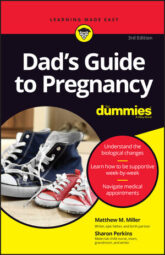Remember dads, the first three months of pregnancy are the time of organ development, so it's also the time when your partner needs to be most careful about what she eats, drinks, and ingests. Let her know — nicely — that you're willing to do whatever you can to help her quit any bad habits or to stay as healthy as possible during these critical months.
Around 18 percent of women of childbearing age smoke, and around 51 percent drink at least occasionally. A lesser but still significant percentage — around 7 percent — use illegal recreational drugs. It's no secret that all these habits have the potential to harm your developing baby, so, at least for the duration of the pregnancy, all three should be off both of your bad-habits lists.
Basics of cigarettes and development problems
Cigarette smoking exposes your partner and your baby to nicotine, carbon monoxide, and tar. All these potentially noxious and harmful substances reduce the amount of oxygen that reaches your baby through the placenta. Additionally, babies born to smokers are often smaller than normal.
A 2014 report from the U.S. Surgeon General also warned that smokers have a 30 to 50 percent higher risk of having a baby born with a cleft lip or palate.
Smoking also increases the risk of stillbirth and placental abruption, where the placenta prematurely dislodges from the uterus and cuts off your baby's oxygen supply. After birth, babies whose moms smoke have a greater risk of dying from sudden infant death syndrome (SIDS).
Do whatever it takes to help your partner quit, preferably before you even start on the pregnancy journey but at the very least with the first positive pregnancy test. And consider quitting yourself; inhaling secondhand smoke can be as damaging as smoking yourself. If you do continue smoking, never smoke in the house, around your partner, or, later, around the baby.
Don't suggest or let your partner think that she can swap her regular cigarettes for e-cigarettes. Sure, at first thought, switching to e-cigarettes, which contain nicotine but no tars or carbon monoxide risk, may seem like a good idea.
But the jury is still out on the safety of e-cigarettes, and they do still contain nicotine. They can also contain other toxins, such as cancer-causing chemicals nitrosamines and formaldehyde. Because they're not regulated like drugs, you can't be sure exactly what you're getting when you vape.
Nicotine causes blood vessels to constrict, which reduces oxygen delivery to your baby — never a good thing. Ultimately, it's safer for both of you to quit all nicotine products during pregnancy.
Basics of drinks during pregnancy
The risks of alcohol use during pregnancy are well documented. Fetal alcohol syndrome can cause learning disabilities, physical abnormalities, and brain alterations that affect mood — for life. Because no one knows exactly how much alcohol is "safe," it's better not to drink any at all during pregnancy.
So what does that mean for you? That's really up to you and your partner. If she was never much for alcohol or can easily live without it, she may not have a problem if you still have a drink or two in her presence. For some couples, women prefer that men don't drink because if the pregnant woman can't, why should her partner?
It may sound extreme, but think about it like you would someone who is dieting. Would you eat a huge piece of cake around someone trying to lose 50 pounds? Regardless of how you and your partner feel about the situation, always drink in moderation; you never know when you may need to be lucid enough to drive to the hospital.
Basics of OTC and prescription drugs and their health risks
Over-the-counter drugs may seem like they must be safe or they wouldn't be so available, but that's not always the case. Non-steroidal anti-inflammatory pain relievers such as aspirin and ibuprofen can affect nearly every system of your baby's developing body and are best known for their potential effects on heart development.
Your partner's medical practitioner will undoubtedly discuss any medications she's taking at her first visit. She'll probably supply a list of acceptable over-the-counter medications and review any prescription medications your partner currently takes.
If your partner takes certain classes of medications, such as antihypertensive drugs or antidepressants, her practitioner will weigh the risks and benefits of different medications and may change your partner to one with fewer known fetal side effects. If her practitioner doesn't bring this up, make sure you do or your partner does so she doesn't worry unnecessarily about medications she's taking or, worse, stop taking them out of fear.
The bottom line during pregnancy is not to take anything not prescribed by a medical practitioner who knows your partner is pregnant. That includes health food supplements, herbs, and commonly used cold, allergy, and flu medications.
If you or your partner ever has any questions over whether a medication or supplement is safe to take during pregnancy, just pick up the phone and call her medical practitioner. It's always better to ask, for peace of mind if nothing else.
How dads can prevent Autism spectrum risks
The increase in mental disorders on the autism spectrum has been staggering over the last few decades. As a result, you may be understandably anxious to do anything you can during pregnancy to reduce the risk that your child will have an autism spectrum disorder. Sadly, there's no one sure way to prevent autism, which may have a genetic component in up to 90 percent of cases.
Taking folic acid — the B-complex vitamin that also helps prevent neural tube defects such as spina bifida — before getting pregnant and early in pregnancy may help reduce the risk of autism, according to one Norwegian study. Ultimately, though, avoiding any known toxins, eating well, and steering clear of unnecessary medications gives your baby the best shot at dodging the autism diagnosis.

